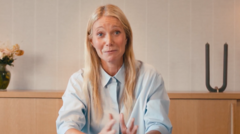As the average age of menopause in India hovers around 47, a growing number of women are facing premature menopause without adequate support or resources. The effects can be debilitating, yet the stigma surrounding the topic hinders open conversations and healthcare access, which advocates argue must be addressed urgently.
Breaking the Silence: Menopause Awareness Grows Among Indian Women

Breaking the Silence: Menopause Awareness Grows Among Indian Women
Despite the rise in premature menopause cases in India, women's health resources and awareness remain alarmingly deficient, prompting a call for change.
In India, conversations surrounding menopause remain shrouded in stigma and silence, despite recent studies indicating that Indian women hit menopause a few years earlier than their Western counterparts. Research shows that the average age of menopause in India is approximately 47, while in the United States, it is generally around 51. Alarmingly, there is an increase in premature menopause cases among women aged 30-39, highlighting an urgent need for better support and awareness.
Dr. Ruma Satwik, a gynaecologist and obstetrician at Sir Gangaram Hospital in Delhi, notes that many women can experience menopause as early as 44 and as late as 50. Factors contributing to this earlier onset may include nutritional deficiencies, environmental circumstances, and genetics. Yet, in a country where menstruation is still frequently considered taboo, discussion around menopause lags significantly.
For women like Sangeeta, a janitor in Delhi, the challenges of menopause are compounded by daily responsibilities, leading to feelings of despair. Lacking knowledge about available health resources, Sangeeta only discovered her hospital's dedicated menopause clinic recently—after enduring severe symptoms for a year. Many women share similar experiences of struggling with symptoms such as hot flashes, insomnia, and mood changes, often without adequate support.
Mini Mathur, a television host in Mumbai, felt completely overwhelmed upon entering menopause. After consulting multiple healthcare providers, she finally found relief through treatments not accessible in India, illustrating the gap in care. As Ms. Mathur highlights, too often, women's concerns about menopause are dismissed, contributing to feelings of isolation and frustration.
According to India's 2011 Census, approximately 96 million women are above the age of 45, a number expected to jump to 400 million by 2026. Dr. Anju Soni, president of the Indian Menopause Society, emphasizes the importance of this demographic, as many women spend a significant portion of their lives post-menopause. However, an under-researched topic, menopause often remains inadequately addressed in medical education, leaving healthcare providers unprepared to support women through these life changes.
While menopause symptoms can be managed with lifestyle changes, supplements, and hormone replacement therapy, inadequate awareness and research hinder timely diagnosis and treatment. Voices advocating for better understanding of menopause are starting to emerge, supported by social media and the experiences of Hollywood celebrities discussing their own menopause journeys.
Women like Mathur are now dedicated to bridging the resource gap for menopause treatment in India. She is pursuing training in the U.S. to better empower other women grappling with menopausal challenges. The need for increased awareness and education among healthcare providers is vital, as women seek guidance on what is often deemed a "natural" process.
To address the care gaps, Dr. Satwik urges medical professionals to prioritize discussions on menopause and perimenopause, akin to the focus currently placed on fertility and adolescent health. Given the existing network of healthcare workers catering to women's health in rural areas, Dr. Soni advocates for extending these services to meet the needs of menopausal women, ensuring that vital support reaches all demographics.
The journey toward elevated menopause awareness and accessible healthcare resources in India remains ongoing and essential, shaping a future where women can navigate this natural life transition with dignity and support.
Dr. Ruma Satwik, a gynaecologist and obstetrician at Sir Gangaram Hospital in Delhi, notes that many women can experience menopause as early as 44 and as late as 50. Factors contributing to this earlier onset may include nutritional deficiencies, environmental circumstances, and genetics. Yet, in a country where menstruation is still frequently considered taboo, discussion around menopause lags significantly.
For women like Sangeeta, a janitor in Delhi, the challenges of menopause are compounded by daily responsibilities, leading to feelings of despair. Lacking knowledge about available health resources, Sangeeta only discovered her hospital's dedicated menopause clinic recently—after enduring severe symptoms for a year. Many women share similar experiences of struggling with symptoms such as hot flashes, insomnia, and mood changes, often without adequate support.
Mini Mathur, a television host in Mumbai, felt completely overwhelmed upon entering menopause. After consulting multiple healthcare providers, she finally found relief through treatments not accessible in India, illustrating the gap in care. As Ms. Mathur highlights, too often, women's concerns about menopause are dismissed, contributing to feelings of isolation and frustration.
According to India's 2011 Census, approximately 96 million women are above the age of 45, a number expected to jump to 400 million by 2026. Dr. Anju Soni, president of the Indian Menopause Society, emphasizes the importance of this demographic, as many women spend a significant portion of their lives post-menopause. However, an under-researched topic, menopause often remains inadequately addressed in medical education, leaving healthcare providers unprepared to support women through these life changes.
While menopause symptoms can be managed with lifestyle changes, supplements, and hormone replacement therapy, inadequate awareness and research hinder timely diagnosis and treatment. Voices advocating for better understanding of menopause are starting to emerge, supported by social media and the experiences of Hollywood celebrities discussing their own menopause journeys.
Women like Mathur are now dedicated to bridging the resource gap for menopause treatment in India. She is pursuing training in the U.S. to better empower other women grappling with menopausal challenges. The need for increased awareness and education among healthcare providers is vital, as women seek guidance on what is often deemed a "natural" process.
To address the care gaps, Dr. Satwik urges medical professionals to prioritize discussions on menopause and perimenopause, akin to the focus currently placed on fertility and adolescent health. Given the existing network of healthcare workers catering to women's health in rural areas, Dr. Soni advocates for extending these services to meet the needs of menopausal women, ensuring that vital support reaches all demographics.
The journey toward elevated menopause awareness and accessible healthcare resources in India remains ongoing and essential, shaping a future where women can navigate this natural life transition with dignity and support.


















